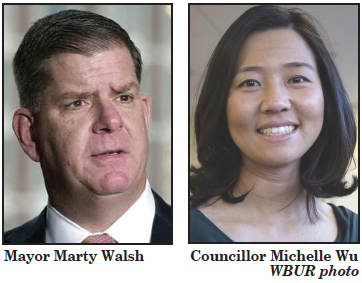July 23, 2020

In a lengthy press conference last Thursday, Mayor Walsh urged that all Bostonians be tested for COVID-19 and said his priority moving through Phase 3 of the reopening process is to “contain the virus and prevent another surge.”
He also used the occasion to offer a strong rebuttal to City Councillor Michelle Wu’s negative critique of the city-led Resiliency Fund aimed at helping small businesses and non-profit organizations.
With the mayor noting that testing is available citywide in more than 20 locations and mobile sites, Marty Martinez, chief of Health and Human Services, added that any individuals who have exposed themselves to larger groups of people, or aren’t wearing masks often enough in public, should be tested regularly.
“To contain COVID, we have to make sure that people know their status,” he said.
Walsh’s remarks on the Resiliency Fund were spurred by an early July Boston Globe OpEd article by Wu where she took issue with the fund and the mayor’s handling of such philanthropic efforts, criticism she again laid out in a WGBH radio interview last week.
Wu is increasingly viewed as a likely candidate for mayor next year, although she has not made any definitive statement to date.
The mayor did not cite Wu by name, referencing only a female councillor.
“We’ve disbursed $1.2 million in grants from the Resiliency Fund this week, to benefit youth programs, seniors, food distribution efforts, and more,” he said. “Since the fund’s inception, we’ve raised over $33 million through private donors, and to date have used $24 million – 53 percent of those grants have gone to organizations led by people of color.”
“I usually don’t respond to things I hear on the radio,” Walsh said, “but if the city councillor took time out of her schedule to go on a call with us she would understand what the Resiliency Fund has done. We’ve been able to put food on peoples’ tables, expand testing to community health centers, expand Telehealth medicine and more.”
Added Walsh: “So when I hear people talk about how it’s not effective, they should take a little bit of their time to learn about why the fund was set up and maybe help us get some money for the fund rather than play Monday morning quarterback on a radio show when they have no idea what they’re talking about when it comes to Resiliency Funds.”
The mayor said the city will invest $400,000 in funding through the Boston Resiliency Fund into a community-specific plan to address inequities the pandemic numbers represent. The funds will be administered to the Greater Boston Latino Network, East Boston Health Center, and Whittier Street Health Center.
“This will expand on the outreach we are doing to provide testing and other support in Latinx communities by reaching families and individuals through grassroots organizations,” said Walsh.
The city’s Health and Inequities task force has also provided guidance to the Walsh administration on expanding testing in Black and immigrant communities, enhancing language access, and placing mobile testing sites in public housing developments and in senior communities.
Rev. Sam Acevedo, a member of the task force, said that the pandemic has “only proven to increase disparities.” He said the funding would allow community groups to enhance testing and support for the Latinx population, and also create bilingual campaigns.
At the press conference, Police Commissioner William Gross said that he was frustrated by continuing violence in Boston, referencing another shooting the previous Tuesday night in which Tanjim Siam, a 21-year-old convenience store clerk, was shot during a robbery on Shawmut Avenue.
“You can see my frustration. A young man from Bangladesh comes here to Boston to seek a better quality of life, and then a coward, trust me a coward, shoots him during a robbery,” he said.
“We know that the mentality in the street is that you can do what you want because the courts are closed and there’s no grand juries. But repeat violent offenders should be held accountable because our neighbors deserve it.”
“Our communities are not desensitized to violence, they do care. Let’s continue to stick together and work to send a message to the repeat public offenders that they will be held accountable,” said Gross.
“I only hope that the judicial process is listening. We should not be bailing people out and putting them on electric bracelets when they get arrested with firearms. It’s just sending the wrong message.”


